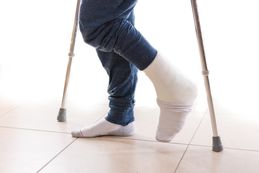Navigating the Medicare/Medicaid Maze When It Comes to Personal Injury

When it comes to Medicare or Medicaid and personal injury claims, following the steps is essential. If you’ve been injured, both Medicare and Medicaid will pay for your medical bills related to the injury. However, if you file a personal injury claim, you’ll be required to pay that money back. In order to navigate through the Medicare/Medicaid maze with ease, your first step should be to seek the assistance of a personal injury lawyer who is well-versed in dealing with these kinds of claims.
What Makes Medicare/Medicaid Different?
Both Medicare and Medicaid have a right to reimbursement for everything it pays out for a personal injury claim. In order to protect this right, a lien is placed on any compensation received—essentially securing it as debt. While Medicare is a federal program and Medicaid is a state-run agency, they both place an automatic lien on your case for any compensation received in your personal injury case.
While both programs provide access to free health care for qualifying individuals, there can be differences in the amount that is reimbursed in a personal injury case based on the state where the injured resides.
Filing A Personal Injury Claim With Medicare Vs. Medicaid
 Medicare is a federal program which is reimbursed only for the medical payments made regarding the personal injury case. This can be a doctor’s visit, hospital stay or medical equipment used during the recovery process.
Medicare is a federal program which is reimbursed only for the medical payments made regarding the personal injury case. This can be a doctor’s visit, hospital stay or medical equipment used during the recovery process.
As a federally funded, state-run program, Medicaid can not only asks for reimbursement of all medical expenses related to the personal injury claim—it can also ask to be payed for any compensation received for unrelated items, like pain and suffering or wage losses. It’s especially important to discuss your case with an experienced personal injury attorney in Ohio if Medicaid is involved, so you can keep as much of your settlement as possible.
Reporting A Personal Injury Settlement
Once a settlement is received for a personal injury claim, both Medicare and Medicaid must be notified immediately to process the lien held on your disbursement. Any delay in reporting the settlement can result in a fine, or their offices may require you to personally pay for the medical expenses. Once reported, both programs will document any medical costs related to the injury and report a final lien amount for reimbursement. It’s important to go over all of these costs with a personal injury attorney to make sure all the documented treatments only relate to the personal injury claim.
What If You Don’t Report A Settlement?
It can be tempting to claim a personal injury settlement on your own. If the claim isn’t reported, how will Medicare or Medicaid ever know about it? Payments for certain injuries can trigger an alert to federal- or state-run programs, prompting someone to contact you and ask if your injury was the result of someone else’s negligence. Failure to respond truthfully could result in your coverage being dropped, or worse—criminal charges.
Working with Medicare or Medicaid doesn’t have to be a hassle. An experienced personal injury attorney can walk you through the steps to ensure prompt settlement reporting so you can concentrate on moving on with your life. The expert legal team of Pater, Pater & Halverson Co. in Hamilton, Ohio, will guide you through your claim to ensure you receive the compensation you deserve. Visit the website or call (513) 867-1411 to discuss your personal injury case today. You can also connect with the attorneys on Facebook for more information about personal injury, estate planning, and more.
About the Business
Have a question? Ask the experts!
Send your question

